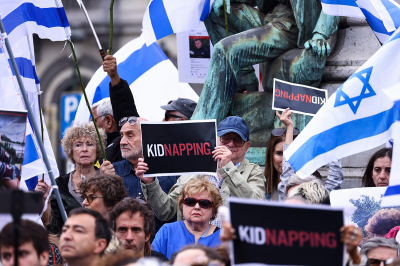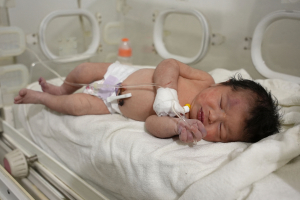The war in Gaza is not about revenge — it is taking Hamas at its word

As the reality of war sets in and the worst elements of Western culture attempt to obfuscate moral truth, the essential facts of the Israel-Hamas conflict remain the same. This war, which Hamas started and could end today if they chose, isn’t about vengeance. It is about taking Hamas at its word when it says it wants to obliterate Israel and its Jews and finally responding to the ugly truth that “mowing the grass” hasn’t worked.
On October 7th, Hamas, an Iran-backed terrorist organization that has controlled the Gaza Strip since 2007, launched a land, sea, and sky attack on Israel — an act of terrorism that resulted in the highest number of Jewish deaths in a single day since the Holocaust.
In the aftermath, thousands of people across the U.S. and Europe scrambled to the streets and to their keyboards to blame Israel for the violence, tacitly or explicitly support Hamas, and celebrate the bloodshed.
But, while the West jumps at the opportunity to justify the actions of Hamas through “decolonization at all costs” and other intellectual gymnastics, Hamas itself makes no such effort.
The atrocities we witnessed — the rape of women, abduction of children, and intentional slaughtering of civilians — were not unfortunate means to a just end; they were the objective. Marching orders found on captured and killed terrorists make this clear. In Alumim, Southern Israel, a squad was directed to “achieve the highest level of human losses” and then take hostages. In Sa’ad, they aimed “to take control of the kibbutz, kill as many individuals as possible, and capture hostages until receiving further instructions.”
This tactic, while horrifying, is only surprising because many people have refused to take Hamas at its word. The 1988 Hamas Charter explicitly states, “Israel, Judaism and Jews challenge Islam and the Moslem people,” and “The Day of Judgement will not come about until Moslems fight the Jews (killing the Jews).” In the preamble, it claims, “Israel will exist and will continue to exist until Islam will obliterate it, just as it obliterated others before it.”
The destruction of Jews is part of their eschatological aim, and they will spare no civilian — not even their own — to bring it about.
For decades, Israel has tried to disentangle itself from the Gaza Strip. But it has become increasingly clear that so long as Hamas persists, no amount of “mowing the grass” — a term coined to describe Israel’s philosophy of containing and shutting down consistent attacks from Hamas — will suffice.
In the era of the Camp David Accords, Israel tried to cede control of the Gaza Strip to Egypt, but Egypt refused. In 2005, Israel pulled out of Gaza entirely and forced over 8,000 Israelis to leave. Since Hamas seized control of the strip in 2007, Israel has followed a philosophy of containment and mitigation. Conflicts have largely followed a standard path, with Hamas and Islamic Jihad firing rockets into Israel and Israel responding with airstrikes targeting military targets, culminating in an eventual “until next time” resolution.
But, after the attacks on October 7th, it has become clear to Israeli leadership that this strategy has to change. It is time to pull up the grass — Hamas and Islamic Jihad — by the roots while making every effort to spare civilians so the bloodshed of both Israelis and Palestinians can finally end.
But now we are in the awful reality of war, and even just war is gruesome.
Independent investigations have confirmed that Hamas uses schools, mosques, and hospitals as weapons depots and military headquarters and regularly launches rockets toward Israel from civilian centers, introducing the added danger of misfires. Despite Israael’s repeated warnings to evacuate Northern Gaza toward the South, Hamas has told Gazans to stay put, and Egypt has refused to accept refugees or allow safe passage for those with foreign passports.
Regardless of what some bad actors may have you believe, Israel has zero interest in civilian casualties. Targeting civilians or exercising anything other than the highest care possible in fraught situations would violate Israel’s Hebraic values and undermine its claim to the moral high ground — an essential asset as it tries to retain the support of Western democracies.
While no one knows what will follow if Israel successfully dismantles Hamas, we know one thing. In the words of Michael Herzog, Israeli Ambassador to the U.S.: “So, we (Israel) have no desire to occupy or reoccupy Gaza … We have no desire to rule over the lives of over two million Palestinians.”
Even still, war is always an ugly matter, especially when terrorist organizations force their own people into harm's way. While the war is just, the loss of human life, especially innocent life, is always a tragedy. Now more than ever, those looking on from the West need to keep two things in mind at once: It is possible to support Israel in its necessity of ending Hamas while exercising deep compassion for those caught in the crossfire.
As the region settles into what could be a protracted and bloody conflict, we must retain moral clarity about how this war started and how it must end while doing all we can to avoid becoming callous.
Ultimately, the possibility of peace between Israelis and Palestinians, while further off than it was before October 7th, isn’t dead because it can’t be dead. When the dust settles, Israelis and Palestinians will still be living side by side. This means it will be the task of prudent statesmen and women to find a creative path forward where Palestinians and Israelis alike can thrive, free from the oppression and genocidal aims of Hamas.
Liza Ashley is Associate Director of the Charles Malik Institute at the Philos Project. She regularly writes and speaks on topics relating to religion, culture, and foreign policy.




























